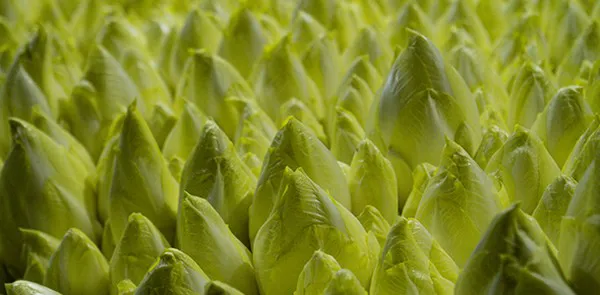Chicory prices are still good even as summer approaches, says Charles Cattoir of the Belgian company Primalof which specializes in hydro chicory. "Spring has been long and good. Now, in the second half of April, demand is still generally excellent. The export market's getting somewhat quieter, but the European market remains nice for the time of year," he begins.

According to Charles, the limited and later local greenhouse vegetables could be a reason for this. "People are still reaching for chicory, it seems. It's a world of difference from 2022 with its very low volumes. This year had to improve substantially to recover that year's losses." There's another side to the story, though, he adds.
"The 2022 crop, as mentioned, was minimal. With early 2023's good prices, everyone's continuing production longer. If there's demand, everybody keeps working longer at 100%. We, too, have continued up to six weeks longer, so stocks are shrinking significantly. We've only really been slowing down for two weeks, but that was a considerable drop-off," says Charles.
Careful with the stock
He explains that the fall season must not be compromised. "The April and May weather is pretty dull. In 2022 we could sow our acreage around May 5, but last weekend we had another 15 to 20 liters of rain on our plots, and it's still not dry. There's thus very little chance of us getting the ridges ready for seeding by the end of this week. We could still sow at the same time as last year, but restarting quickly looks to be extremely difficult. That means the chances of grubbing in mid/end September also decrease weekly."

"So, everyone must work very carefully with stocks to bridge the season. We have a fairly safe schedule planned, but trading must be done wisely. May to July are usually weaker months, chicory consumption-wise, though. I, therefore, expect balance during the summer," says Cattoir.
He remains delighted with prices. "The average auction prices normalized slightly in the last few weeks. They're not as high as in January/February, but they're still very high for the time of year. I also think that, as long as there's no seeding yet, supply will seriously decline in the coming weeks."
"I suspect that will lead to prices even rising a little. That's good, though, because they're acceptable for both consumers and producers and, with the high costs, needed too. Market stability is a must to overcome 2022's blows. No big profits are being made yet, but things seem to be recovering," Charles continues.

Crop protection products
Yet, chicory cultivation still faces challenges. "On the one hand, leased land supply is ever dwindling. In Belgium, there's tremendous competition from potatoes. Those growers are willing to pay more and have higher yields per hectare. We have to consider that." On the other hand, Charles says, the lack of crop protection products poses perhaps an even greater threat. "Essential chicory growing plant protection products are going to be banned soon," he says.
"One of them even from next season. That's going to be very challenging if there are no alternatives. Work's being done, but solutions must come quickly because otherwise, it's a totally different world. Many growers will have to switch to manual labor to keep everything on track. Then you're quickly talking €2.000 to €2.500 more per hectare in extra costs. That could be the death blow for many," Charles concludes.
For more information: Charles Cattoir
Charles Cattoir
Primalof
23 Leeg Bracht
9860, Balegem, Belgium
Tel: +32 (0) 483 484 717
Email: [email protected]
Website: www.primalof.be
